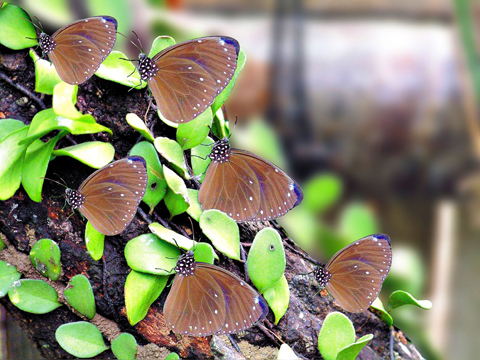Much to wildlife conservationists’ amazement and joy, Taiwan’s largest purple crow butterfly habitat managed to withstand devastation wrought by Typhoon Morakot, which battered southern Taiwan in early August.
“A recent field survey shows that the gorges of Seshe and Maolin Ecological Park in Kaohsiung County’s Maolin National Scenic Area [MNSA] — the traditional winter habitat of the special migrating butterfly species — remained mostly unscathed,” Wu Mao-sheng (吳茂盛), director of MNSA Administration, said on Thursday.
Usually the colorful creatures begin arriving in large numbers in Maolin’s (茂林) valleys in November, but this year, the first ones arrived early last month, Wu said.

PHOTO: LEE WEN-YI, TAIPEI TIMES
“The number of wintering purple crow butterflies is expected to be impressive this year, judging from the fact that the number of those arriving in October far surpassed the figure recorded for the same period of last year,” Wu said.
About 400,000 purple crow butterflies were documented in the Maolin valleys last year, volunteers from the Taiwan Purple Crow Butterfly Ecological Preservation Association said.
With the recent drop in temperature in northern Taiwan, volunteers said they expected more butterflies would come to Maolin for wintering this year and that the number could match the previous high of 1 million.
“Usually, more than 100 butterflies will flutter over one’s head in five minutes,” a volunteer said.
As most of the butterflies rest in higher altitude valleys, tourists can only see scattered butterflies within river valleys during sunny mornings, the volunteer said.
In recent years, the MNSA Administration has regularly organized guided butterfly-watching tours to allow more wildlife enthusiasts to admire the insects close up.
Wu said a biennial butterfly-watching program would run from Dec. 12 to March 6.
Mountainous townships in the region, including Maolin, Liouguei (六龜), Taoyuan (桃源), Sandimen (三地門), Majia (瑪家) and Wutai (霧台), were all severely devastated by flooding and landslides.
After being closed to tourists for three months, major pathways in the region have been repaired and paved with asphalt, Wu said.
“While large coaches will still be barred … medium-sized buses, SUVs and compact cars can cruise the area safely,” Wu said.
As a prelude to the biennial butterfly watching festival, Wu said his office would join forces with the Liouguei township office in organizing a drumming event at the township’s Baolai Junior High School this weekend dedicated to survivors in the region.
U Theatre will head a group of hearing-impaired students in performing its signature drum piece, Mandala Dedication, which was performed at the opening ceremony for the 2009 Summer Deaflympics in Taipei in September.
The program will be named “Drum Wish” as organizers say they hope the sound and rhythm of drumming can encourage typhoon-affected people to regain faith and rebuild their lives and careers.

The Ministry of Foreign Affairs (MOFA) yesterday voiced dissatisfaction with the Comprehensive and Progressive Agreement for Trans- Pacific Partnership (CPTPP), whose latest meeting, concluded earlier the same day, appeared not to address the country’s application. In a statement, MOFA said the CPTPP commission had "once again failed to fairly process Taiwan’s application," attributing the inaction to the bloc’s "succumbing to political pressure," without elaborating. Taiwan submitted its CPTPP application under the name "Separate Customs Territory of Taiwan, Penghu, Kinmen and Matsu" on Sept. 22, 2021 -- less than a week after China

THE GOOD WORD: More than 100 colleges on both sides of the Pacific will work together to bring students to Taiwan so they can learn Mandarin where it is spoken A total of 102 universities from Taiwan and the US are collaborating in a push to promote Taiwan as the first-choice place to learn Mandarin, with seven Mandarin learning centers stood up in the US to train and support teachers, the Foundation for International Cooperation in Higher Education of Taiwan (FICHET) said. At the annual convention of the American Council on the Teaching of Foreign Languages held over the weekend in New Orleans, Louisiana, a Taiwan Pavilion was jointly run by 17 representative teams from the FICHET, the Overseas Community Affairs Council, the Steering Committee for the Test of Proficiency-Huayu, the

A home-style restaurant opened by a Taiwanese woman in Quezon City in Metro Manila has been featured in the first-ever Michelin Guide honoring exceptional restaurants in the Philippines. The restaurant, Fong Wei Wu (豐味屋), was one of 74 eateries to receive a “Michelin Selected” honor in the guide, while one restaurant received two Michelin stars, eight received one star and 25 were awarded a “Bib Gourmand.” The guide, which was limited to restaurants in Metro Manila and Cebu, was published on Oct. 30. In an interview, Feng Wei Wu’s owner and chef, Linda, said that as a restaurateur in her 60s, receiving an

MORE RETALIATION: China would adopt a long-term pressure strategy to prevent other countries or future prime ministers following in Sanae Takaichi’s steps, an academic said Taiwan should maintain communications with Japan, as Japanese Prime Minister Sanae Takaichi is to lead a revision of security documents, Taiwanese academics said yesterday. Tensions have risen between Japan and China over remarks by Takaichi earlier this month that the use of force against Taiwan would constitute a “survival-threatening situation” for Japan. Prospect Foundation president Lai I-chung (賴怡忠) yesterday said Takaichi’s stance regarding Taiwan is the same as past Japanese prime ministers, but her position is clearer than that of her predecessors Fumio Kishida and Shigeru Ishiba. Although Japan views a “Taiwan contingency” as a “survival-threatening situation,” which would allow its military to